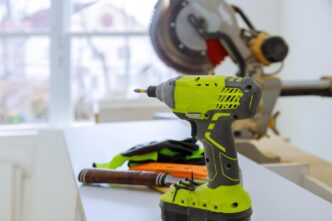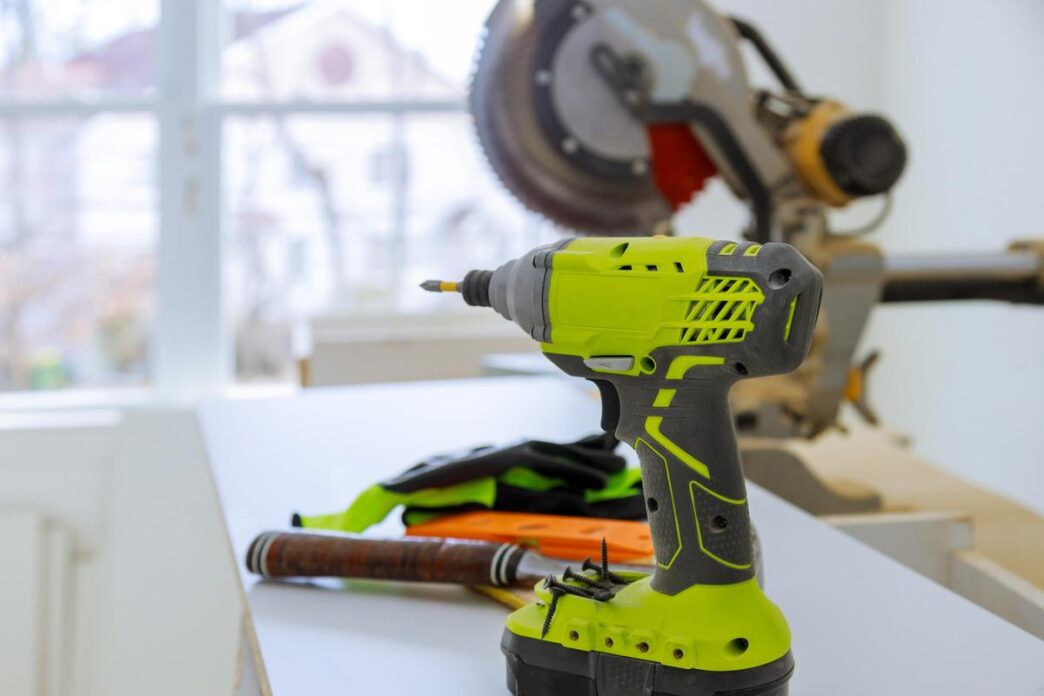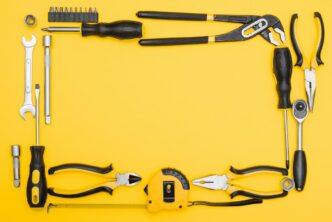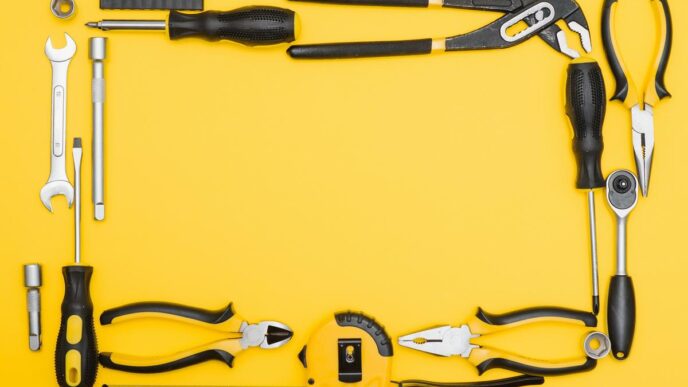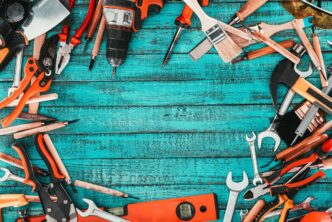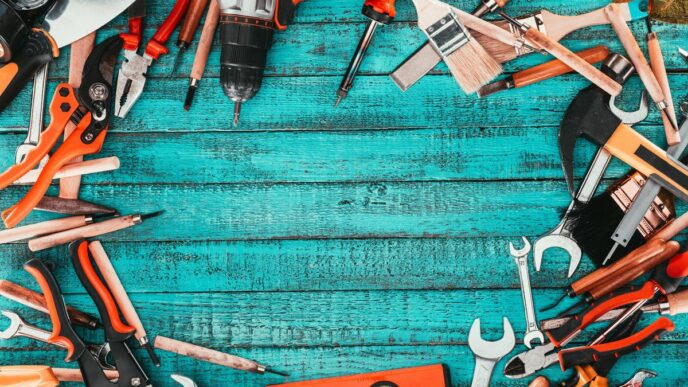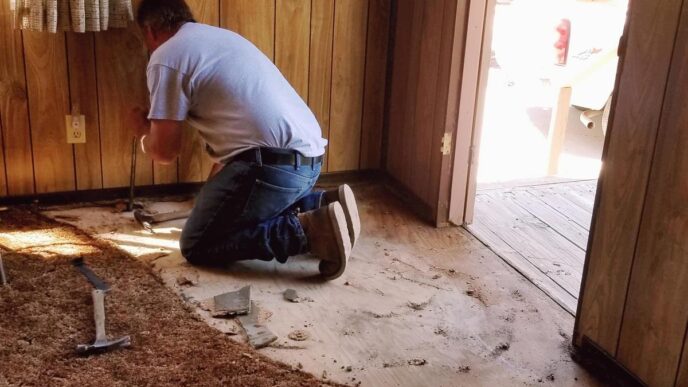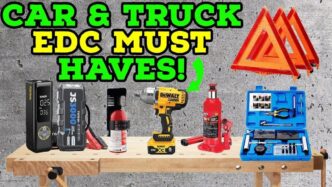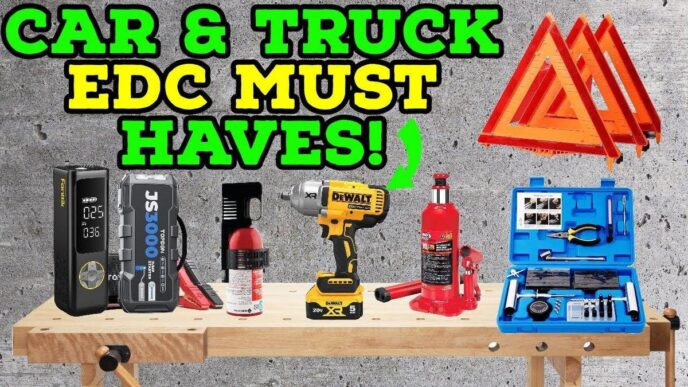Key Takeaways:
- Battery Technology: A powerful, long-lasting battery is essential for cordless tools. Brands like Dewalt excel with innovations like PowerStack.
- Motor Efficiency: Brushless motors, such as those in Milwaukee’s M18 line, provide longevity and high torque.
- Ergonomics: Comfortable grips prevent fatigue. Dewalt and Milwaukee are noted for user-friendly designs.
- Cordless Advantages: Offer mobility, safety, and ease of storage.
- Essential Tools: Must-haves include a drill/driver, impact driver, reciprocating saw, circular saw, and multi-tool.
- Portability and Versatility: Cordless systems like Ryobi's 18V One+ allow tool and battery interchangeability.
- Top Brands: Milwaukee is noted for ruggedness; Dewalt excels in battery technology.
- Ryobi: Offers cost-effective solutions for DIYers with a large range of compatible tools.
- Tool Set Selection: Consider battery type, tool variety, ergonomics, brand reputation, and price when choosing.
Choosing the right cordless power tools can transform your home projects. Are you overwhelmed by the many options? Don’t worry; I've got your back! Whether you’re tackling big home repairs or small fix-it tasks, knowing what makes a cordless tool stand out is crucial. From features like battery life to the best brands out there, I’ll guide you in picking the best tools for your home. Let's get started!
What Makes a Cordless Power Tool Stand Out?
The debate over which cordless power tool stands out is endless. But to me, certain key features make a big difference. These features separate high-quality tools from the rest. As a seasoned tool enthusiast, I've spent countless hours trying and comparing various brands. Here’s a breakdown of what I believe sets the best apart.
When it comes to cordless tools, battery technology stands front and center. A powerful, long-lasting battery is crucial. Brands like Dewalt excel here. Their PowerStack pouch cells are a game changer. This means longer use and less downtime recharging. It’s exactly what you need when tackling a big project. You also want a tool that offers great runtime without wearing out the battery too quickly.
Motor efficiency matters too. Brushless motors are the gold standard. They last longer, with less maintenance. Milwaukee’s M18 line shines here. Their motors offer high torque and are great for heavy-duty tasks. This makes them reliable and strong performers.
Ergonomics is another key feature. The tool should feel good in your hand. An ergonomic design prevents fatigue during long jobs. A tool that feels right lets you work longer with less strain. Brands like Dewalt and Milwaukee excel in making user-friendly designs.
Each detail can impact how simple and effective the tool is to use. A tool with the right torque and speed settings can handle various materials. This flexibility is ideal for a variety of tasks around the home. Balancing power and control helps prevent damage to your work.
Now, let’s talk about the advantages of cordless tools. First, the freedom to move is unbeatable. No cords mean you can work anywhere, even without an outlet. This mobility is a lifesaver when working in areas like the yard or attic. It also means fewer trips and less hassle.
Cordless tools are also safer. No cords mean fewer chances for trips or tangles. They eliminate the risk of a cut cord, which can be a safety hazard in busy jobs. Moreover, storing them is simpler. Tools can be packed away without winding cords.
Battery-powered tools also require less maintenance than their corded siblings. No worries about cord wear and tear here. The convenience of grabbing a tool and using it cannot be understated. If the battery is charged, you’re good to go.
Some may worry about power trade-offs with cordless tools. While this was true before, now, technology is changing the game. High-end brands compete to offer power equivalent to corded tools. This means DIYers and pros alike can trust these tools for tough jobs.
Finally, storage and transport ease are added perks. Cordless tools are compact and fit neatly in toolboxes. They’re perfect for travel to job sites or quick home tasks. Their portability adds value for users with limited space.
In summary, cordless power tools have specific features and advantages that make them stand out. These tools combine technology, portability, and ease of use. Investing in a high-quality tool can save time and effort on home projects. Whether for casual users or skilled DIYers, the right cordless power tool can transform work.
Which Cordless Tools Are Essential for Home Repairs?
Choosing the right cordless tools can vastly improve your home repair projects. But which ones do you truly need? Let’s dive into the must-have tools that every homeowner should consider.
What Are the Must-Have Cordless Tools for Homeowners?
🔧 Drill/Driver: A cordless drill is the Swiss army knife of your tool arsenal. It drills holes, drives screws, and handles fix-it tasks with ease. Dewalt and Milwaukee both offer solid options with their 20V Max range, renowned for reliability and power.
🔨 Impact Driver: These tools make light work of stubborn screws. When your drill struggles, the impact driver takes over. Its compact size offers extra power and control, especially useful in tight spaces.
🪛 Reciprocating Saw: For those bigger demolition jobs, this tool is your go-to. Cut through wood, metal, or plaster with precision. Milwaukee’s M18 series stands out, offering cordless freedom with professional-grade performance.
🪜 Circular Saw: Essential for any cutting needs, a circular saw is perfect for quick jobs. Dewalt's FlexVolt series provides a range of cuts and is praised for balance and ease of use.
🛠 Multi-Tool: Quick, tiny fixes or tricky corners? A cordless multi-tool handles the details. It sands, scrapes, and cuts with different attachments. Ryobi's range offers versatility at a budget-friendly price, perfect for DIY enthusiasts.
🔩 Cordless Jigsaw: This tool is apt for curved and intricate cuts. It excels wherever precision is needed with its adjustable speed and maneuverability.
🔍 Cordless Screwdriver: A hardworking yet less powerful alternative to a drill/driver, handy for lighter tasks and furniture assembly.
By focusing on these essentials, you have a versatile collection of tools capable of handling most home repairs with ease.
How Can Cordless Tools Offer Portability and Versatility?
Portability is a game-changer for cordless tools. Imagine being free from cords that always seem to tether you to an outlet, restricting your range. If a light bulb needs changing in the farthest corner of the attic, or if you're working outdoors, cordless tools make it simple. Many come with accompanying toolkits or carrying cases for easy transport without the need for weighted extension cords.
Versatility is another key benefit. One battery powers multiple tools, thanks to platforms like Ryobi's 18V One+ system. Have a battery from a drill? Use it in a jigsaw, work light, or hedge trimmer. This capability saves money and provides ease during repairs. Milwaukee’s M12 line, though bulkier due to battery design, ensures you can handle a wide range of tasks with just a few tools.
Cordless tools also elevate the work experience through ergonomic designs. Their comfortable grip prevents strain during longer tasks. For instance, Milwaukee provides user-friendly alternatives noted for great ergonomics despite the bulkier appearance of their M12 tools. Every grip, button, and switch is designed for the user, offering seamless transitions between tasks.
Why Choose Cordless Over Corded?
Cordless tools have evolved. They often match or even surpass the power of their corded counterparts. What makes them a superior choice is their improved convenience and advancing innovation, especially in battery technology. Brands like Dewalt utilize cutting-edge PowerStack pouch cells, offering performance boosts and outlasting older systems.
Moreover, with the advent of high-performance batteries, runtime and charging features have seen improvements. Fast charging and longer battery life ensure your cordless tools are always ready, minimizing downtime—vital for long house projects or professional use.
Key Features to Look For
-
Power and Battery Technology: Look for lithium-ion batteries due to their longer life and swift charging. Dewalt's PowerStack and Milwaukee's advancements lead the field. A higher voltage typically means greater power. Brands like Dewalt offer systems that adapt voltage to the tool's needs.
-
Ergonomic Design: A comfortable tool is an effective tool. Always opt for one that feels right in your grip.
-
Weight and Size: No one wants a heavy tool for overhead drilling. Weigh the balance between power and portability.
-
Brand Ecosystem: Stick within battery platforms. Dewalt's 20V Max system or Ryobi's 18V One+ saves money and maximizes compatibility.
-
Additional Features: Look for brushless motors for longer tool life, LED lights for dark spaces, and safety features.
Balancing Needs with Budget
Finding quality on a budget is possible. Ryobi’s 18V One+ series uniquely fits homeowners who want performance without the cost. Even though updates in battery technology lag behind Dewalt and Milwaukee, their tools deliver notable value. Other budget-friendly options include Craftsman’s V20 line, although it lacks more advanced options seen in higher-end brands.
On the opposite side, high-tier brands maintain unique tool selections but can limit the average DIY user by cost. Festool, for instance, is known for its quality but also its price.
Final Thoughts
Your home's specific needs shape the tools you should get. Are you a DIY enthusiast looking for flexibility, or are professional-grade tools from Dewalt and Milwaukee more your style? Understanding what you value will guide you to the best selection. Want to explore more details on choosing tools? You might want to check some online resources.
How Do Brands Like Milwaukee and DeWalt Compare?
When it comes to top cordless tools for homeowners, Milwaukee and DeWalt often stand out. Both brands have earned a reputation for being reliable and powerful. But how do they compare, and why are they considered among the most reliable brands of cordless power tools?
Why Are Milwaukee and DeWalt Considered Reliable Brands?
Precision Answer: Milwaukee and DeWalt are known for their quality, durability, and innovation.
Milwaukee's tools are known for ruggedness and long-lasting performance. They make their tools with strong materials that can handle tough jobs. Their tools are also known for being user-friendly, which means less hassle during home projects.
DeWalt has a reputation for solid performance and comfort. Users love the way their tools fit in the hand. They do a fantastic job balancing power and ease of use. DeWalt also stays ahead with their battery innovations, which power their tools longer and charge faster.
How Do Their Features and Innovations Compare?
Precision Answer: Milwaukee focuses on performance and ease, while DeWalt leads in battery tech.
Milwaukee's M18 and M12 lines offer tools that professionals trust. They are known for long battery life and tough structures. Milwaukee regularly updates their tools, adding new features that make work easier. Sometimes, their smaller tools seem bulky due to battery designs.
DeWalt takes battery technology to new heights with its PowerStack and FlexVolt systems. These systems give tools more power and longer run time. They also allow users to switch between different volt levels, making them versatile. The range of their accessories can confuse, but once learned, they become a powerful tool series.
When deciding between them, consider what your projects need. For heavy-duty tasks, Milwaukee's strong build may be best. If you need tools that work long hours without changing batteries, DeWalt's advanced battery tech can’t be beaten.
How Other Brands Stack Up
Ryobi is another name frequent in DIY environments. The 18V One+ system offers many choices, perfect for simple home projects. However, they may not be as tough or advanced as Milwaukee or DeWalt. Buyers on a budget enjoy Ryobi’s affordability, even if some features are sacrificed.
Bosch, though slow in innovation, introduced AmpShare to enhance compatibility. It's a great step but lags in the US market. Craftsman grows in value with the V20 line but still lacks variety. This can limit what more intense users need.
Festool is known for high quality but not range, and its prices are high. Newer brands like Flex enter with next-gen tech but need time to spread out enough. Hart sticks with basic power tools but lacks innovation.
Metabo HPT offers a MultiVolt system but suffers poor market presence. Kobalt and Porter Cable both have limited selections and low impact, needing more innovation, especially Porter Cable lately.
What to Consider for Your Home
Think about your home project needs. Milwaukee and DeWalt lead in versatility and reliability. Each offers unique benefits: Milwaukee for toughness, DeWalt for battery power. Whether tackling DIY tasks or more professional work, evaluate your needs. Look through each option to see which fits best for your projects.
In summary, both Milwaukee and DeWalt are leaders. They offer powerful cordless tools that suit many tasks. Remember to assess your needs and the unique strengths of each brand. This way, you can make the best choice when investing in cordless power tools.
What Factors Influence Battery Life and Efficiency?
Battery life and efficiency mean more when using cordless tools. To make the best choice, understanding factors that affect them is vital. A tool's battery performance directly influences its usefulness in home projects. Knowing how to optimize this ensures you get the most power and lifespan from the tools you pick. Let's dive into what affects these and how you can maximize their benefits.
What Determines Battery Performance in Cordless Tools?
The power type and capacity determine battery performance first. Most cordless tools use lithium-ion batteries due to their reliability. These batteries are powerful, charge fast, and last longer. Li-ion batteries also offer consistent power until nearly empty, unlike older types. However, their capacity, measured in amp-hours (Ah), is key. Higher Ah means longer use time between charges. If you see two tools with the same voltage but different Ah, the one with the higher Ah will last longer.
Battery voltage also influences performance. Higher voltage provides more power but doesn't always mean longer run time. It's suitable for heavy tasks like drilling tough surfaces. But for light tasks, lower voltage suffices and conserves battery.
Another factor is the battery's age and condition. Over time, all batteries degrade, which reduces efficiency and life. Heat is a big enemy of battery health. Keeping tools in a cool place extends their life. Try not to store batteries in direct sunlight or other hot places.
How Can Homeowners Optimize Battery Efficiency?
To keep batteries working well, proper care and usage are crucial. First, charging right is important for good battery health. Always use the charger made by the tool's maker. Charging with the proper charger ensures safety and efficiency. Overcharging is bad, so remove the battery once it's full.
Discharge levels impact efficiency too. It's best not to let batteries drain entirely before recharging. Partial discharges keep batteries healthy longer. Fully recharging them also helps maintain their capacity.
Regularly check battery contacts for dust and dirt. A clean contact point ensures power flows well between the battery and tool. Always store batteries half charged when not in use. This helps extend their lifespan.
When choosing a cordless tool brand, consider those known for good battery tech. Brands like Festool offer quality and innovation in battery design. Some brands with unique advancements, such as pouch-cell tech, enhance efficiency. Look for tools that tell you the battery level; they help manage power use better.
Another tip is to match the battery size to your projects. Large batteries feel heavy, which tires you out faster. If you only do small jobs, smaller batteries will do. They are lighter and often charge quicker.
Finally, practice smart usage habits. Use the right tool for the job. Avoid pushing the tool too hard, which drains power quickly. A well-matched task and tool use less energy and preserve the battery.
In the end, every part of battery care matters for cordless tools. Maintaining proper charging habits, choosing well-powered batteries, and picking the right brands enable longer-lasting performance. This helps in ensuring that you can always rely on your tools, project after project.
What Are the Benefits of Lightweight Cordless Tools?
Lightweight cordless tools are a game-changer. These tools make any job easier. They are perfect for anyone who values easy handling. Imagine trying to fix a shelf or drill a hole. A heavy tool makes this hard. You tire out quickly. But a lightweight tool makes a big difference. You can work longer without feeling worn out.
Why opt for lightweight designs in cordless power tools? Precision: Lightweight tools reduce strain on your wrists and arms. This means less fatigue during long tasks. They let you reach places you couldn't before. You can hold them in awkward angles without tiring. They give you more accuracy and control. Lightweight cordless tools for easy handling are less likely to slip. This keeps your work neat. Clean cuts, precise holes, and smooth finishes show the power of lightweight tools.
And what else? Think about your safety. Heavy tools can cause accidents if you drop them. Lightweight tools make your work area safer. They are easier to carry and store. You avoid sore muscles and tense shoulders. This is great news for those who do lots of home projects.
How does ergonomic design enhance tool handling? Precision: Ergonomic designs fit better in your hand, making them more comfortable to use. They reduce strain on your body. With an ergonomic handle, you grip firmly without pressure on your thumb and fingers. This keeps the tool stable in your hand. It also helps prevent injuries like cramps or blisters.
Good ergonomic design includes a balanced weight. Balanced tools don't tip over easily. They feel natural, like an extension of your arm. This improves your stance and technique. You also save energy because you use less force. These features boost your efficiency. You finish tasks faster.
What about temperature and vibration? Some tools get hot quickly. Good ergonomic designs help cool the tool. This keeps your hand comfortable. It also absorbs vibrations. Less vibration means smoother operation. Your work area stays quiet and peaceful.
Battery life also matters. Lightweight tools often have better battery designs. You avoid dealing with heavy batteries. But you still get all the power you need. Some models even have long-lasting batteries that charge quickly, so you never run out of power.
Brands like DeWalt and Milwaukee understand the need for good ergonomics. They offer many options with excellent ergonomic features. This makes them a top choice for both professionals and DIYers. Users love how these brands balance weight, power, and comfort.
Ryobi, another popular choice, has lightweight selections too. Their ergonomic design in cordless power tools is suitable for many users. If you value comfort and ease, Ryobi is worth considering. They cater to DIYers with tools that fit well in any hand.
To sum up, lightweight and ergonomic cordless tools are a smart choice. They save you effort and time. They enhance safety and comfort. They make working on projects enjoyable. When you pick a tool, think about how you'll use it. Choose the right design and enjoy all the benefits.
How Does Ryobi Cater to DIY Enthusiasts?
Is Ryobi suitable for budget-conscious DIYers? Absolutely, Ryobi is an excellent choice for those watching their wallets. Ryobi provides a wide range of budget-friendly cordless power tools that deliver reliable performance. The brand's 18V One+ platform is particularly popular. It includes a vast array of tools that share the same battery system, making it cost-effective for users who want to expand their tool collection without buying new batteries each time. This system includes everything from drills and saws to nailers and garden equipment. Ryobi focuses on offering practical and user-friendly tools that cater specifically to the DIY market.
Ryobi tools are easy to use and provide adequate power for most household projects. You don't need to be a professional to handle their tools effectively. The ergonomics are often designed with the average user in mind, ensuring that you can work comfortably over extended periods. Plus, their lighter weight is a boon for users who might struggle with heavier, industrial-grade tools.
What are users saying about Ryobi's performance? Many users are quite satisfied with what Ryobi offers. Reviews of popular cordless brands frequently mention Ryobi's great value. While Ryobi may not have the advanced features of some high-end brands, it compensates by being dependable and straightforward. Users often express appreciation for the balanced performance-price ratio, highlighting Ryobi's convenience for typical home repairs and small projects.
The positive reviews, however, don't ignore the limitations. Ryobi's battery technology isn't as advanced as some competitors, like Dewalt's FlexVolt or Milwaukee's high-demand RedLithium batteries. Enthusiasts recognize that Ryobi's tools may have less power and run time than those of higher-tier brands. But, for the average DIY task around the home, they work well enough.
Some users note the unique tools in Ryobi's USB Lithium series, which caters to niche applications. This makes the brand appealing to those wanting to experiment with different tool types without breaking the bank. Ryobi gives DIYers choices, providing peace of mind with a reliable tool paired with good customer support. It's crucial, however, to evaluate your specific project needs to determine if Ryobi is the best fit. Choosing the right brand involves considering reliability, power, ergonomics, and battery technology.
For a budget-conscious DIYer who prioritizes value and variety, Ryobi stands out. Their tools are affordable yet capable, making them a smart option for beginners and casual users. They empower DIYers to accomplish a wide range of tasks without requiring a significant financial investment. The satisfaction derived from completing home projects using Ryobi tools enhances their appeal.
Competition with other brands exists, particularly in the budget-friendly market, but Ryobi's extensive One+ platform gives it a distinctive advantage. It aligns with home enthusiasts who value a wide product selection backed by a single power source. That battery interchangeability simplifies tool management and saves costs on having to invest in multiple systems. With a solid balance of cost, variety, and usability, Ryobi remains a favored choice among many DIYers.
How to Choose the Best Cordless Tool Set?
What should you look for in a cordless tool set? First, examine the battery type. Modern cordless tools often use lithium-ion batteries. These batteries charge quickly and last longer. You don’t want to be stuck with an old nickel-cadmium (NiCad) setup. NiCad batteries are heavier and lose power faster.
Next, consider the voltage. Look for 18V or 20V sets, as they deliver enough power for most home jobs. Dewalt’s 20V Max lineup is a great example. It provides solid performance for various tasks. A higher voltage usually means more power, but it can also mean more weight.
Tool variety in the set matters too. Basic sets typically include a drill, saw, and light. For more projects, seek additional tools like a sander or jigsaw. Milwaukee and Ryobi offer some versatile sets perfect for wider project needs.
Check for ergonomic design. Cordless tools should feel comfortable in your hands. Balance and grip are key for longer tasks. Milwaukee’s tools often receive praise for good handling. They may feel bulkier due to battery size but offer better control.
Consider the brand’s reputation. Dewalt and Milwaukee are top names known for reliability and quality. Dewalt also leads in battery technology with its PowerStack pouch cells. This innovation might be what sets certain sets apart.
Look into the price range as well. Higher-priced sets often offer more features and tools. In contrast, budget-friendly options, like Ryobi’s 18V One+, might suffice for less demanding work. Ryobi's tools are ideal for DIY jobs and offer excellent value.
Finally, don’t forget to check if the set offers innovative tech features. Advanced models may include smart tech such as brushless motors. These motors enhance efficiency and prolong tool life, making them a smart buy.
Which kits are ideal for beginners in home projects? For a beginner, consider Ryobi or Craftsman tool sets. These brands offer affordable entry-level tools. While not as advanced as Dewalt or Milwaukee, they are perfect starting points.
Ryobi’s USB Lithium series includes unique tools ideal for light tasks. It provides just enough power without a hefty price tag. Craftsman, too, has improved recently with its growing V20 line. This set might have fewer offerings but fits simple home projects.
A beginner benefits from versatile sets like those from Kobalt. Though Kobalt lags in variety, its tools are practical and dependable. The included tools work well for basic repairs and lightweight tasks around the house.
Deciding on a cordless tool set doesn’t mean overspending. Many good options are available to suit your needs and budget. Each tool set from different brands caters to specific project types. Evaluate what you need to find the best fit.
Conclusion
Choosing cordless tools can transform your DIY projects. We've covered key features to seek in high-quality tools and their benefits. Essential tools like drills and saws offer portability and versatility. Brands like Milwaukee and DeWalt lead in reliability and innovation. Battery life depends on usage; care is key to efficiency. Lightweight designs improve handling and comfort. For budget-buyers, Ryobi presents a strong choice. Follow these tips to pick the right tool set for your needs. With the right gear, you'll tackle any repair with confidence and ease!
